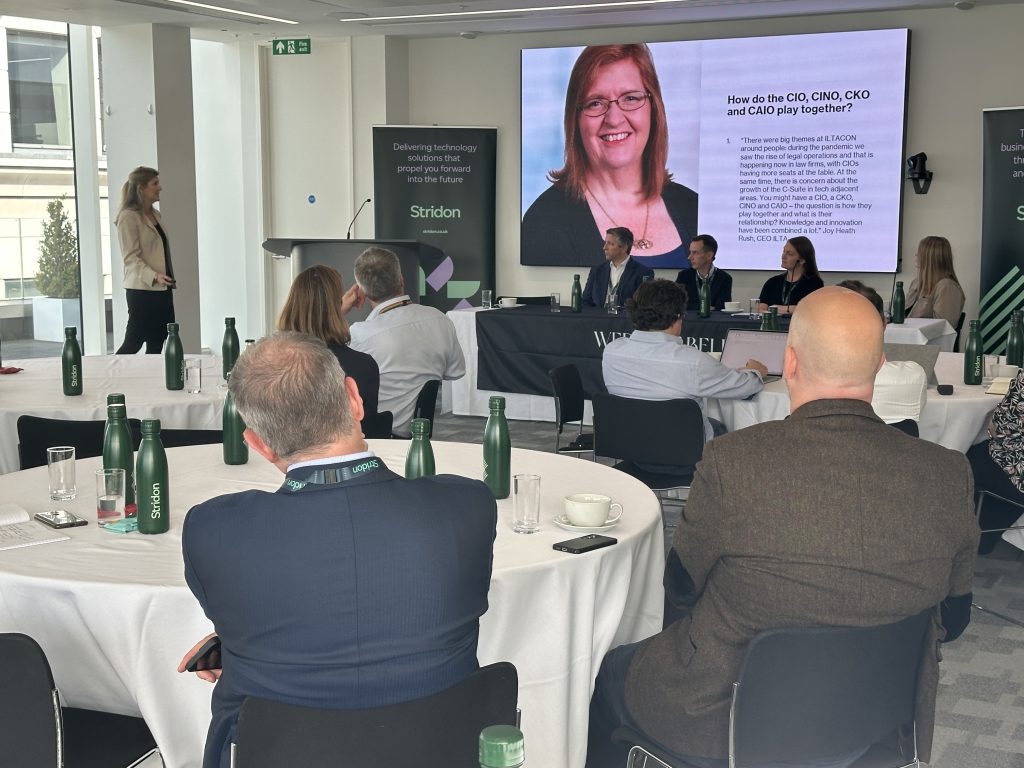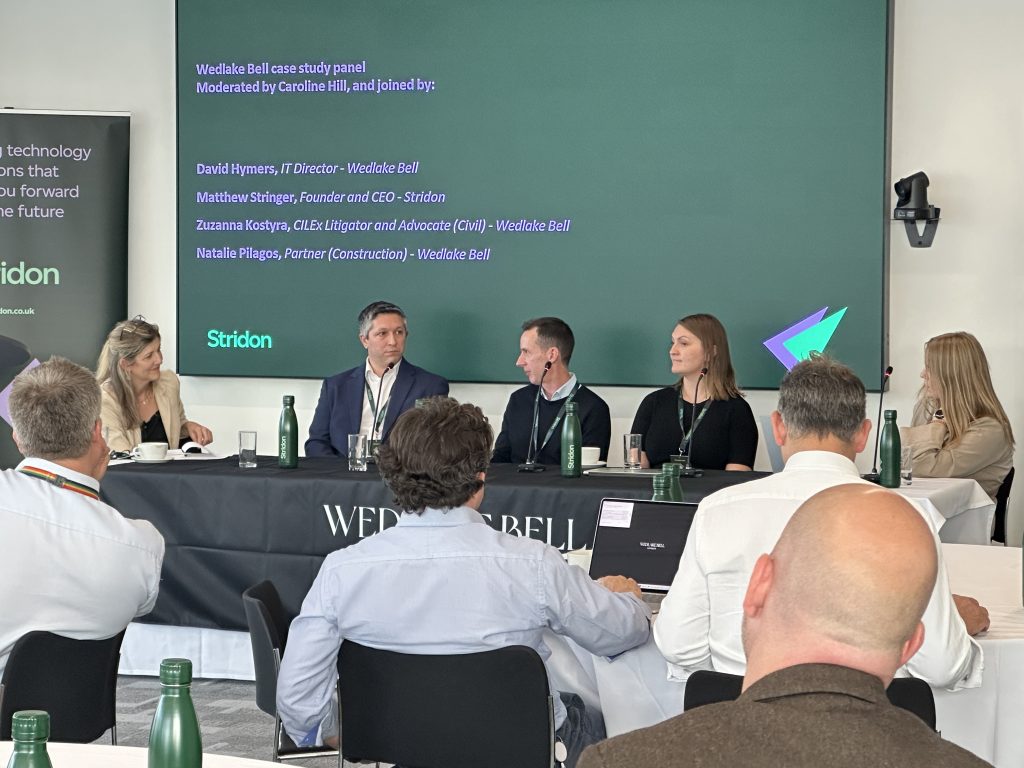Among medium-sized law firms, there are very few with ubiquitous adoption of Microsoft Copilot, but in a showcase I hosted recently at Wedlake Bell, the UK law firm discussed the work it has been doing with legal technology consultancy Stridon to not only adopt Copilot, but drive change across the organisation.
The afternoon started with a quick presentation from me on some of the latest generative AI trends in the industry, with a heavy emphasis on the ‘people’ part of people, process and technology. There is a temptation right now to focus purely on GenAI technology, but what was refreshing about this afternoon is how genuinely people-centric Wedlake Bell and Stridon are in their thoughts and adoption strategies.

Our panel discussion focused on Wedlake Bell’s Copilot transformation journey and included Matthew Stringer, CEO and founder of Stridon; David Hymers, Wedlake Bell’s IT director; Natalie Pilagos, head of the contentious construction team at Wedlake Bell and one of the sponsors of the Copilot project; and Zuza Kostyra, a CILEx litigator and civil advocate at Wedlake Bell, who is one of the project champions and also an avid user of Copilot.

Hymers has been working with Stridon for nine years on a transformation journey, including modernising the firm’s technology infrastructure and becoming cloud-first – a win during lockdown.
For its more recent GenAI journey, Wedlake Bell has used Stridon’s five-step Copilot adoption framework, which sees firms establish core principles, policies and technical readiness right through to setting up project teams and champions. A lot of focus has gone into change management and training programmes, and Stridon has also helped Wedlake Bell to measure and report on ROI, which is ordinarily regarded as a challenge. Wedlake Bell is towards the end of the process of rolling Copilot out firm-wide.
Speaking on the panel, Stringer observed: “Yes, this is about technology. But at the end of the day, it’s the biggest opportunity for fundamental change that we will likely face in our lifetimes.”
Wedlake Bell has two Copilot sponsors and 27 champions across the firm. The firms has provided regular user training and Hymers says that most people who have Copilot are using it on a daily basis. Wedlake Bell has built a centre of excellence where all training materials are available alongside shared success stories.
Use cases are very varied but, much like the experience reported by other firms, Hymers says that Copilot helps to avoid that ‘blank sheet of paper’ when drafting. Speaking on the panel, Hymers said: “If I’m writing an IT policy document, I’d have to start from scratch but now I can just ask Copilot for a first draft of a policy document and then I need to spend an hour or so just tweaking it.” Copilot can be good for running emails and other documents through to improve their quality and spelling, for example.
Much like with other GenAI tools and in contrast to the days of buying tech to solve specific problems, it’s important to allow and encourage people to find their own value in the tool.
Pilagos and Kostyra talked us through how the sponsors and champions have helped to drive training, communication, understanding and adoption. Kostyra is an avid AI user and was using mainstream GenAI tool Perplexity before the firm banned it, with Copilot a good substitute that she says she now couldn’t work without. Interestingly, she said that working with Copilot has made her work more engaging, commenting: “It’s almost like I’m collaborating with somebody.”
Pilagos observed that she rarely uses Google now; a trend that people are seeing more widely. Examples of use cases she gave include asking Copilot if a response from a party addresses her earlier letter, and a gap analysis of what they have left out – “things that might take hours to try to figure out.” She uses Copilot to review and help to unpick expert construction reports that are very technical. When she has talked to colleagues about the time savings, it had the intended effect of encouraging them to ask for their own license.
Pilagos and Kostyra both warned that Copilot can get things wrong and hallucinate and users need to be clear on the risks and carefully check the output. Stridon advocates and reenforces the need for the human in the loop, with Stringer observing: “You don’t just feed in a task and say ‘oh, it’s done’ and then off you go, you always maintain the oversight around it. Maybe one day we’ll get there, but that’s further down the road. You need constant reenforcement around what’s safe.”
When it comes to times savings from using Copilot, Stridon and Hymers talk earnestly about giving people time back to improve their quality of life. I have a tendency to be cynical about these sorts of things, but through qualitative and quantitive surveys Wedlake Bell has found that users save 30 to 60 minutes a day and Hymers said: “Somebody said to me ‘I leave an hour early because Copilot enables me to do that’. It’s not hypothetical, it’s real world results we’re getting.”
There is a tendency across the legal industry to be sceptical about GenAI – perhaps a backlash against the hype – but Wedlake Bell and Stridon have turned a lot of people into converts. One thing for sure is that there is senior buy in and backing at Wedlake Bell, which is key. Managing partner Martin Arnold has been involved in the tech transformation programme as has residential property partner Tom Allfree, who is head of the innovation committee. It’s still very early days and there’s much to do, but Stringer says: “We need a pragmatic approach. We don’t need to be at the vast pointy end of ‘let’s automate everything’. There is so much work that can be done at the very early stage of just uncovering and unlocking some of the things that are frustrating and get in the way, in order to enable us to do better things every day.”


